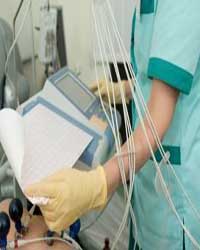ECG
-
in Diagnostics

ECG (electrocardiogram) is a diagnostic method of the heart that allows to assess its condition. It can be used to assess the source of the rhythm, the regularity of heart contractions, and the frequency. The essence of the method is to register the electrical potentials that arise during the work of the heart and to display them graphically.
ECG is a painless and harmless procedure. It does not require special preparation, but you should not use oily body cream on this day. Dress so that the clothes are comfortable and easy to remove. Try not to wear pantyhose.
The examination takes place as follows: the patient is placed on a couch, having previously been asked to remove his shirt, and electrodes are attached to the chest, arms and legs. Next, the person lies down, and the computer will create an image of the pulses. Then the doctor will decipher the data. In addition to a standard ECG of the heart, the doctor can refer the patient to other specialized cardiac examinations: a consultation with a cardiologist, ultrasound of the heart, Holter monitoring.
Do not wait for a ready-made diagnosis. It can be prescribed by a doctor after a comprehensive examination taking into account complaints, medical history and other important information.
If the ECG is necessary for hospitalization, it will be deciphered by the therapist who gives a green light for the operation. If the ECG is necessary as a diagnostic technique for establishing a diagnosis, then it must be decoded. A cardiologist can do this. When signing up for an ECG, be sure to specify the reason for the ECG with the administrator. You may need a consultation with a therapist or a cardiologist.
Check the price
ECG is a painless and harmless procedure. It does not require special preparation, but you should not use oily body cream on this day. Dress so that the clothes are comfortable and easy to remove. Try not to wear pantyhose.
The examination takes place as follows: the patient is placed on a couch, having previously been asked to remove his shirt, and electrodes are attached to the chest, arms and legs. Next, the person lies down, and the computer will create an image of the pulses. Then the doctor will decipher the data. In addition to a standard ECG of the heart, the doctor can refer the patient to other specialized cardiac examinations: a consultation with a cardiologist, ultrasound of the heart, Holter monitoring.
What can be seen on the ECG?
- the driver of the rhythm (that is, where the impulses come from);
- regularity of heart contractions;
- rhythmicity of heart contractions;
- description of intervals and amplitudes of teeth, comparing them with normal indicators;
- if there are pronounced disorders, in which part of the heart did they occur (for example, a heart attack);
- the approximate time of the violations that occurred (for example, the stage of a heart attack).
ECG should be done in case of such complaints:
Children:
- rapid growth of the child
- feeling unwell after physical education
- constant pallor and shortness of breath after slight physical exertion.
Adults:
- increased blood pressure;\discomfort and pain in the heart area, especially pressing pains;
interruptions in the work of the heart; - a rhythm is too slow or too fast;
- if there was a fact of loss of consciousness;
- there are complaints of shortness of breath, weakness, pain in the chest or back;
- experienced cerebral circulation disorder (stroke), rheumatism, diabetes, chronic inflammation of various localization;
annually to all healthy people as a preventive examination; - to people who plan to engage in physical activity;
- people who are overweight;
- those people whose direct relatives have or had a history of high cholesterol, stroke or heart attack, other diseases of the heart and blood vessels.
Do not wait for a ready-made diagnosis. It can be prescribed by a doctor after a comprehensive examination taking into account complaints, medical history and other important information.
If the ECG is necessary for hospitalization, it will be deciphered by the therapist who gives a green light for the operation. If the ECG is necessary as a diagnostic technique for establishing a diagnosis, then it must be decoded. A cardiologist can do this. When signing up for an ECG, be sure to specify the reason for the ECG with the administrator. You may need a consultation with a therapist or a cardiologist.
Check the price



